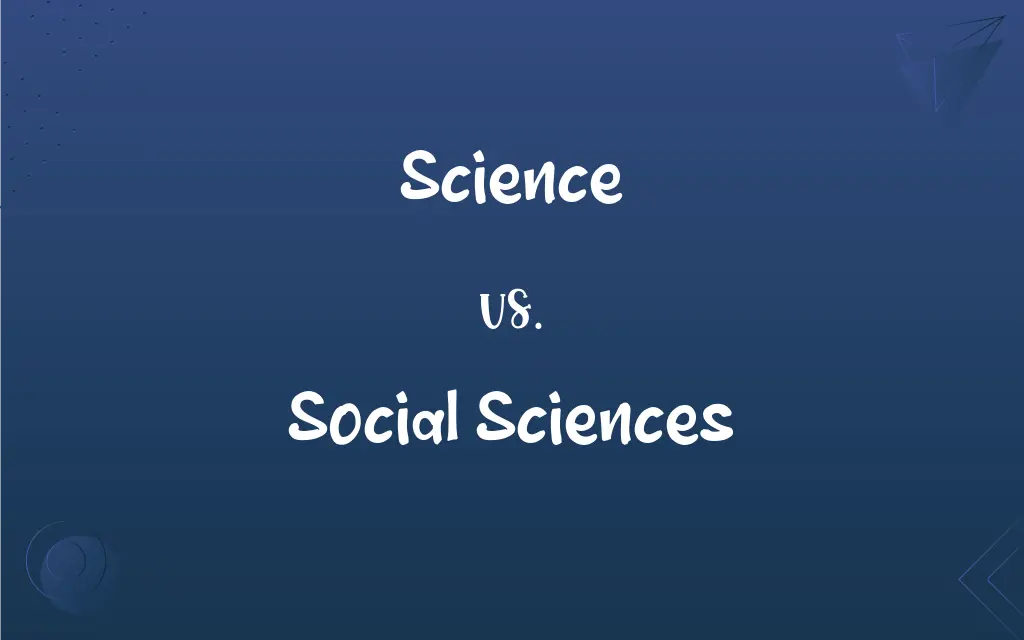Science vs. Social Sciences: What's the Difference?
Edited by Aimie Carlson || By Janet White || Published on February 26, 2024
Science studies the natural world through empirical methods, while social sciences explore human society and social relationships.

Key Differences
Science refers to the systematic study of the structure and behavior of the physical and natural world through observation and experiment. In contrast, social sciences focus on the study of human behavior and societies, delving into aspects like psychology, sociology, and anthropology.
In science, researchers often engage in controlled laboratory experiments to understand natural phenomena, ranging from physics to biology. On the other hand, social sciences rely more on qualitative research methods like case studies and interviews to understand social patterns and human interactions.
The methodology in science typically involves quantitative analysis, relying heavily on mathematical and statistical tools. Conversely, social sciences often incorporate both quantitative and qualitative methods, understanding that human behavior cannot always be quantified.
Science seeks to discover universal laws and principles, like the laws of gravity or thermodynamics. In contrast, social sciences explore the diversity of human experience, acknowledging that societal norms and behaviors can vary greatly across different cultures and historical periods.
The outcomes of science research often lead to technological advancements and a deeper understanding of the natural world, whereas social sciences primarily contribute to our understanding of societal structures, cultural dynamics, and human psychology.
ADVERTISEMENT
Comparison Chart
Focus
Natural world and physical phenomena
Human society and social relationships
Research Methods
Empirical, quantitative, and experimental
Qualitative, often with case studies
Goal
Discover universal laws
Understand human behavior and societies
Analysis
Quantitative, using statistics
Both quantitative and qualitative
Practical Application
Technological advancements
Societal and cultural understanding
ADVERTISEMENT
Science and Social Sciences Definitions
Science
An endeavor to discover and explain the laws of nature and the physical world.
Science has revealed the intricate details of DNA.
Social Sciences
A branch of science focused on societal constructs and human behavior.
In social sciences, sociologists study social stratification and class systems.
Science
The study of the physical and natural world through observation and experimentation.
Through science, we understand why the sky is blue.
Social Sciences
Academic disciplines that examine society and how people interact and develop as a culture.
Anthropology, a branch of social sciences, studies ancient human societies.
Science
A discipline involving the observation of natural phenomena and conducting experiments to formulate and test hypotheses.
Marie Curie’s work in science led to groundbreaking discoveries about radioactivity.
Social Sciences
The study of human society and social relationships.
In social sciences, researchers explore the impact of culture on behavior.
Science
A systematic enterprise that builds and organizes knowledge in the form of testable explanations.
The field of science has transformed our understanding of the universe.
Social Sciences
Fields of study that analyze the structure and functioning of human society.
Economists in social sciences analyze market behaviors.
Science
The pursuit of knowledge and understanding of the natural and social world following a systematic methodology.
Science often requires careful experimentation and analysis.
Social Sciences
Disciplines that examine the psychological, social, and cultural aspects of human life.
Social sciences provide insights into the dynamics of family and relationships.
Science
The observation, identification, description, experimental investigation, and theoretical explanation of phenomena
New advances in science and technology.
Science
Such activities restricted to a class of natural phenomena
The science of astronomy.
FAQs
What is the main focus of science?
The main focus of science is the study of the natural and physical world.
Can science help in technological advancement?
Yes, science often leads to technological advancements.
What are some examples of science fields?
Examples include physics, chemistry, biology, and astronomy.
What methodologies are commonly used in science?
Science commonly uses empirical, quantitative, and experimental methodologies.
Can social sciences impact policy making?
Yes, insights from social sciences often inform public policy and social reforms.
What research methods are used in social sciences?
Social sciences often use qualitative methods like case studies and interviews.
Do science and social sciences intersect?
Yes, in fields like psychology, which have elements of both.
Are science and social sciences equally important?
Yes, both contribute uniquely to our understanding of the world and human existence.
What is the goal of social sciences?
The goal is to understand human behavior and societal structures.
Is science limited to quantitative analysis?
Primarily, yes, but it can occasionally incorporate qualitative elements.
Can social sciences include quantitative analysis?
Yes, social sciences can include both quantitative and qualitative analysis.
Are social sciences as empirical as science?
They can be, though they often deal with more subjective data.
How does science differ from social sciences in practical application?
Science often leads to practical, technological solutions, while social sciences contribute to societal understanding.
Are the findings in science more reliable than in social sciences?
Reliability varies; science often offers more concrete data, but social sciences provide crucial insights into less tangible aspects of human life.
Can science explain human emotions?
To some extent, through fields like neuroscience, but social sciences provide deeper insights into emotional and psychological aspects.
What is the main focus of social sciences?
The main focus of social sciences is human society and social relationships.
Is experimentation a part of social sciences?
Yes, though it's often different in nature from science experiments.
How does science contribute to medical advancements?
Through biomedical research and pharmaceutical studies, science contributes significantly to medical advancements.
Do social sciences help in understanding cultural diversity?
Yes, social sciences play a key role in understanding and appreciating cultural diversity.
How do science and social sciences influence education?
Both shape educational curricula, with science focusing on empirical knowledge and social sciences on understanding human behavior and society.
About Author
Written by
Janet WhiteJanet White has been an esteemed writer and blogger for Difference Wiki. Holding a Master's degree in Science and Medical Journalism from the prestigious Boston University, she has consistently demonstrated her expertise and passion for her field. When she's not immersed in her work, Janet relishes her time exercising, delving into a good book, and cherishing moments with friends and family.
Edited by
Aimie CarlsonAimie Carlson, holding a master's degree in English literature, is a fervent English language enthusiast. She lends her writing talents to Difference Wiki, a prominent website that specializes in comparisons, offering readers insightful analyses that both captivate and inform.
































































